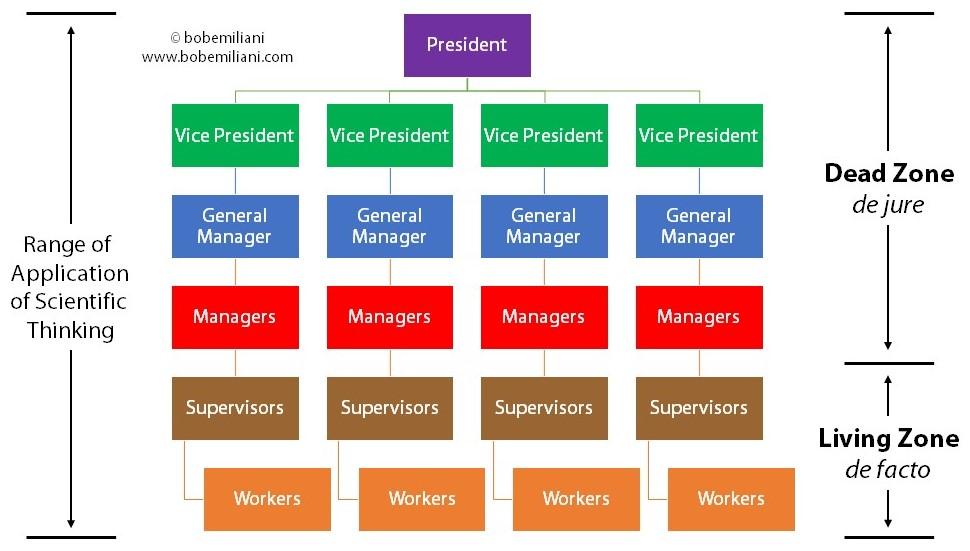
For many years now, there has been a great emphasis in the Lean movement on the development of problem-solving skills. Specifically, teaching people how to think scientifically through the use of PDCA, kata, coaching, etc. Typically, the target audience for training in scientific thinking is working-level people, not managers or executives. The hope is that workers trained in scientific thinking will rise in their organizations to become managers and executives — maybe even president or CEO.
The hypothesis is that the person will carry this learned way of thinking — the habit of scientific thinking — to the top of the hierarchy and apply it. What is the basis for this hypothesis? What is the belief that informs the hypothesis? Is it valid? Unfortunately, the hypothesis is more of the character of a wish or dream. How do we know? The evidence has been in plain sight, in way or another, forever:
- It is usual for a person trained for decades in scientific thinking, such as a scientist or engineer, to abandon that way of thinking soon after becoming a manager or executive.
- Typically, workers are frustrated with their managers and executives. Why? Because the decisions they make are illogical — and thus obviously devoid of scientific thinking.
- Management decisions are most often made with money in mind, typically to achieve a gain at some else’s expense. Such decisions reflect the rights and interests of business (de jure), not the actual work accountable to cause-and-effect (de facto). In other words, leaders, to a great extent, can do as they please, while workers must strictly attend to the unhallowed facts of their processes.
- You present the facts to management, yet the decision made is inconsistent with the facts.
- The existence of structural features in business that assure power-based relationships (e.g. organization chart, metrics, executive pay and perks, etc.) are more important than the facts as illuminated by scientific thinking.
- The requirement that workers must use Lean tools and methods, while managers and executives are exempt from their use.
- The often-said cliché about business, “The more things change, the more things stay the same,” is a testament to the lack of scientific thinking among leaders, and the dominance of the status quo as enabled by de jure thinking (i.e. “strategic complacency”).
A funny thing happens on the way to the top of an organization. Scientific thinking dies. And it dies remarkably quickly — not in every case, but usually. Toyota’s management method, from which Lean is derived, relies on the application of scientific thinking in all levels of the organization. The ratio tilts towards de jure at the very top of an organization, even Toyota, because it is a necessary element of leadership practice. But de jure does not overtake de facto, and that is what is most important.
So now we must ask why, in most organizations, does scientific thinking die? The answer is not a simple one, unfortunately. If you want to defeat this problem (a Type 4 Problem in Art Smalley’s taxonomy), you will need to know a lot more than you know now. My book, The Triumph of Classical Management Over Lean Management: How Tradition Prevails and What to Do About It will be your guide. In it, you will read a detailed analysis and confront a distasteful recitation of uncomfortable facts. You will also learn that root causes are a tangled, interconnected and interdependent network of elements — nothing so simple as a linear fishbone diagram or 5 Whys analysis. But reading it will be highly illuminating and thus worth it. With new knowledge comes new solutions to old problems.
In closing, are efforts today to teach workers PDCA, kata, coaching, etc., in vain? No, because the work still needs to get done and scientific thinking leads to needed improvements in products and processes, and hopefully makes work easier. Scientific thinking must live at the working level; if it does not live there, the company will die. Are efforts to teach PDCA, kata, coaching, etc., to managers and executives in vain? In most cases, yes. Business leaders do not respect scientific thinking because scientific thinking (de facto) does not, and will never, respect traditions, vested rights, privileges, etc. (de jure).
This is the sad truth, one that threatens the continued existence of Lean itself. This problem can only be corrected by broadening one’s understanding of the problem. I hope you enjoy my book.
